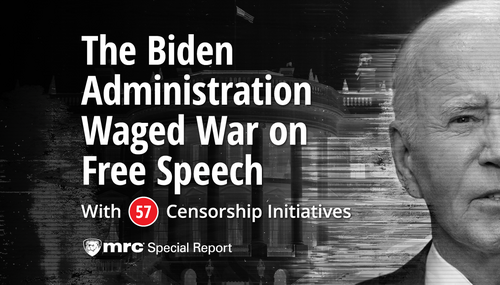New York Times reporter Adam Goldman passed along warnings from “law enforcement” (and, more importantly, liberal Democrats in Congress) that President Trump’s decision to declassify and release texts and documents related to the wiretap against his former adviser Carter Page would endanger national security: “Ignoring Security Concerns, Trump to Make Russia Documents Public.”
It’s a familiar outcry and one that The Times has voiced previously, putting the paper at risk of becoming the proverbial boy who cried wolf, warning of vague nightmarish scenarios if classified documents are made available (not that the paper has anything against printing classified material, just the wrong kind).
The paper didn’t appreciate the release, in July 2018, of a redacted version of the FBI's application for a Foreign Intelligence Surveillance (FISA) warrant to wiretap Page: “Without Evidence, Trump Claims Vindication From Release of Carter Page Documents.”
But The Times went truly hysterical over the release of the so-called Nunes memo -- the four-page memo produced by House Intelligence Committee Chairman Rep. Devin Nunes (R-CA) detailing alleged misconduct in the FBI and Department of Justice in the FISA court application regarding surveillance of Page. Nunes’ memo was released in February 2018 against fierce “national security” (and liberal media) objections.
Reporter Nicholas Fandos wrote: “Republicans on the House Intelligence Committee, disregarding Justice Department warnings that their actions would be 'extraordinarily reckless,' voted Monday evening to release a contentious secret memorandum said to accuse the department and the F.B.I. of misusing their authority to obtain a secret surveillance order on a former Trump campaign associate....”
Yet on both occasions, the material was released, and somehow the world didn’t end. But perhaps third time is the charm? Goldman wrote Tuesday:
President Trump ordered law enforcement and intelligence officials to declassify documents related to the Russia investigation and other inquiries, White House officials said on Monday, the latest instance of the president siding with Republican allies on Capitol Hill over federal law enforcement.
Mr. Trump decided to declassify text messages about the Russia inquiry from a handful of law enforcement officials, summaries of interviews in the case and documents related to the surveillance of a former Trump campaign aide investigated for his links to Russia. For months, Mr. Trump and some of his most fervent congressional supporters have clamored for the material’s release against the protests of the intelligence and law enforcement communities.
The Times sudden trust in the goodwill of “the intelligence and law enforcement communities” is certainly convenient:
The move is all but certain to further deteriorate Mr. Trump’s relationship with law enforcement officials. As part of their monthslong attacks on the Russia investigation, the president and his allies have accused law enforcement officials of improperly obtaining a secret warrant to wiretap the campaign adviser, Carter Page. Little evidence has emerged to back the Republicans’ assertions, and Democrats have accused them in return of politicizing a legitimate inquiry with major national security implications.
....
Much of the application was previously released in July, angering the intelligence community and members of the law enforcement who believed that the information should not have been made public and that its release set a dangerous precedent by making public secret methods of investigation.
Former and current F.B.I. officials have expressed concern that the Republican efforts to out the materials could have long-lasting consequences, making it harder to recruit informants willing to help with investigations who are the lifeblood of law enforcement.
This is the same New York Times that gleefully spilled the details of secret anti-terrorist programs during the Bush administration and printed the trove of classified diplomatic cables from the Wikileaks hack. Last year, the paper was forced to explain, unconvincingly, why they published the name of a covert CIA official.




